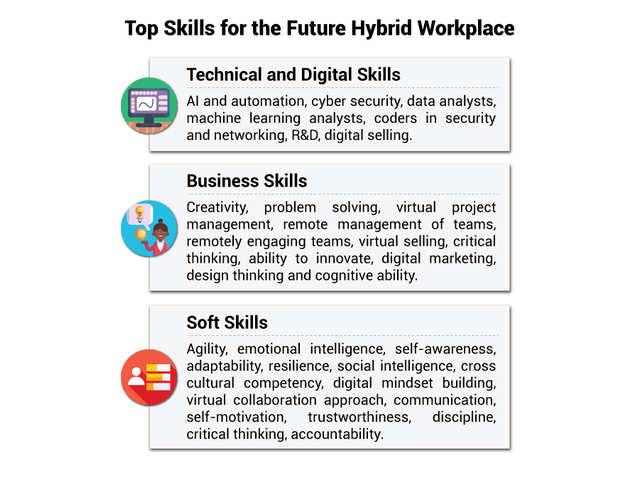![]()
Has the Covid-19 pandemic permanently transformed the workplace?
At least for a large part of the white-collar corporate workforce, the answer is ‘yes’, with many companies adopting work from home and employees likely to continue operating remotely even when things come back to business as usual.
As an increasing number of companies are looking at the option of hybrid workplaces — a blend of remote working and working from office — this has led to reassessing the set of skills and competencies in the new work milieu.
While digital transformation has been a top business priority of many companies over the last couple of years, the pandemic has not only accelerated the use of technology and digital tools but also led to the need for a whole new set of skills for people to function in a remote environment, said the HR heads of leading companies including Infosys, Tech Mahindra, Mastercard, Schneider Electric, NTPC, PFC and Vedanta.
The new skill sets span from core technical skills to digital skills, business skills and soft skills.
“Companies are taking a 360-degree view on skills. This includes digital skills such as digital marketing, business skills such as problem solving, ideation and innovation, and interpersonal skills to communicate effectively in a virtual work environment,” said Anurag Malik, partner, people advisory services, EY India.
“Enterprises are building personalised, interactive and shared virtual communities for which experience-related skills like digital interactions, digital marketing, etc., will be required,” said Krishnamurthy (Krish) Shankar, executive vice president and group head of human resource development, Infosys.
The ability to work from anywhere will be a key competency going ahead, said Priti Singh, senior vice president-HR, South Asia, at Mastercard. “Cognitive skills such as complex problem solving and critical thinking virtually, emotional skills such as emotional intelligence, self-awareness, adaptability and resilience, as well as social intelligence and cross-cultural competency will be critical.”
Mastercard is setting up a digital academy to enhance skills.
Rachna Mukherjee, CHRO, India and South Asia, Schneider Electric, said: “Digital learning and remote working skills have always been a top priority. However, the outbreak of the pandemic further stimulated this need.”
AI and automation skills and cyber security skills will come into prominence in a virtual work set up.
“We expect to see an increased demand for future-ready employee, adept in digital or niche skills like ecommerce, cyber security experts, data analysts, machine learning analysts,” said Harshvendra Soin, global chief people officer, Tech Mahindra.
“The technical skills in demand are role and industry specific,” PeopleStrong chief executive Pankaj Bansal said. In IT, coders in security and networking, microservices, machine learning and Big Data would be in high demand; in pharma demand would be higher for R&D, and manufacturing workers and frontline sales staff with digital selling skills. In auto, connected technology skillset would continue to be in demand, he said.
State-run power major NTPC is in the process of identifying jobs and roles which can be permitted under WFH in the times to come. Skills such as communication, self-motivation, trustworthiness, discipline, critical thinking, adaptability and accountability will be assessed before allowing people WFH, said AN Verma, executive director-HR.
We are providing practical training (Labor Laws, Payroll, Salary Structure, PF-ESI Challan) and Labor Law, Payroll Consultant Service & more:
- HR-Generalist-Practical-Training: https://oneclik.in/hr-generalist-practical-training/ (PF, ESI, Bonus, Payroll & more)
- Labour Code | Labour Bill (Labour-Law-Practical-Training): https://oneclik.in/labour-law-practical-training/ (Factory, Contact Labor, Maternity Act & more)
- PF – ESI Consultant Service: https://oneclik.in/pf-esi-consultant-service/
- Labor Law, Compliance & HR – Payroll Management
- Advance Excel Practical Training
To Get Latest HR, IR, Labor Law Updates, Case Studies & Regular Updates: (Join us on Social Media)
- Telegram Channel: “One Clik”
- Whatsapp Group: https://wa.me/919033016939
- Facebook: One Clik
- Linkedin: One Clik
- Instagram: oneclik_hr_management
- YouTube: One Clik

